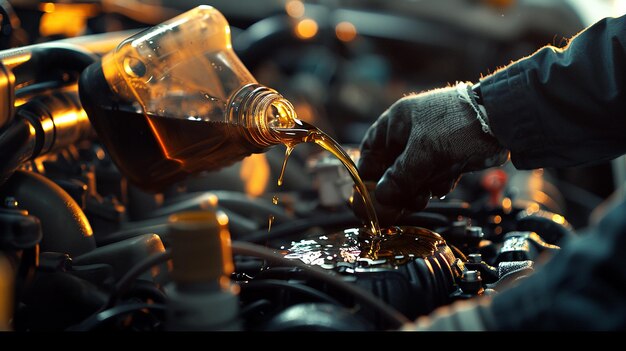Can i used engine restorer and triax oil additive together: A Guide

Can i used engine restorer and triax oil additive together When it comes to maintaining the health of your engine, you might wonder about the compatibility of different products. Engine Restorer and Triax oil additive are two popular options for improving engine performance and longevity. But can you use them together? Let’s dive into this topic and explore the benefits, potential issues, and best practices for engine maintenance.
Understanding Engine Restorer
What is Engine Restorer?
Engine Restorer is a product designed to revitalize aging engines. It typically contains metallic particles that bond to the metal surfaces within the engine, helping to fill in small scratches and imperfections. This can lead to reduced oil consumption, improved compression, and a quieter engine.
What is Triax Oil Additive?
Overview of Triax Oil Additive
Triax oil additive is formulated to enhance the performance of motor oil. It contains friction modifiers and detergents designed to improve lubrication and cleanliness within the engine.
Benefits of Using Triax Oil Additive
- Improved Lubrication: Reduces friction and wear.
- Cleaner Engine: Helps remove deposits and sludge.
- Enhanced Thermal Stability: Protects against breakdown at high temperatures.
How Does Engine Restorer Work?
Engine Restorer works by using a chemical reaction that allows it to adhere to metal surfaces. When added to the engine oil, it forms a protective layer that can help reduce wear and tear, especially in older engines. The product is often recommended for vehicles with high mileage or those that exhibit signs of engine wear.
Exploring Triax Oil Additive
What is Triax Oil Additive?
Triax oil additives are formulated to enhance the performance of motor oil. They can improve viscosity, reduce friction, and offer additional protection against wear and deposits. Triax products may also contain detergents and dispersants to keep the engine clean.
Benefits of Using Triax Oil Additive
- Enhanced Protection: It provides extra protection against wear and tear, extending the life of your engine.
- Improved Performance: Can help your engine run smoother and more efficiently.
- Reduced Deposits: Helps keep the engine clean by preventing sludge buildup.
Can They Be Used Together?
Compatibility Issues
The short answer is that using Engine Restorer and Triax oil additive together is generally not recommended. While both products are designed to improve engine performance, they work in different ways, and combining them could potentially lead to undesirable results.
- Engine Restorer is primarily for rejuvenation, while Triax focuses on lubrication.
- Both products are generally safe to use together, but it’s important to follow manufacturer guidelines.
Manufacturer Recommendations
- Always refer to the product labels or manufacturer websites for specific compatibility information.
- Some manufacturers may recommend using one or the other for optimal results.
Potential Risks of Mixing Additives
- Chemical Reactions: Different additives can react with each other, which might negate their effects or cause harmful deposits.
- Inconsistent Performance: Using multiple products can lead to unpredictable results, making it hard to determine which product is actually benefiting your engine.
Potential Concerns
Overloading the Oil System
Using too many additives can lead to an overload in the oil system. This might dilute the effectiveness of both products.
Chemical Reactions
While both products are designed for engine improvement, there’s a slight risk of adverse chemical interactions. Always test on a small scale before a full application.
Best Practices for Engine Maintenance
Using Engine Restorer Alone
If you decide to use Engine Restorer, it’s best to apply it on its own. Follow the manufacturer’s instructions for the correct dosage and application method. This way, you can effectively assess its impact on your engine’s performance.

Read Also: collecting-hair-samples-from-brushes-research-irb-guidelines
Using Triax Oil Additive Alone
Similarly, if you opt for the Triax oil additive, use it by itself. Ensure your engine oil is changed regularly and maintain proper levels to maximize the benefits of the additive.
Follow Instructions
- Always read the instructions provided on the labels.
- Use the recommended amounts to avoid overuse.
Regular Maintenance
- Ensure your engine is in good shape before using any additives.
- Regular oil changes and maintenance can complement the benefits of both products.
Conclusion
While both Engine Restorer and Triax oil additive can provide significant benefits to your engine, using them together may not be the best idea due to potential compatibility issues. For optimal results, choose one product at a time and monitor your engine’s performance to see which works best for you.
FAQs
Can I use Engine Restorer with synthetic oil?
Yes, Engine Restorer is compatible with synthetic oils. Always check the label for specific recommendations.
How often should I use Engine Restorer?
It’s typically recommended to use it every oil change, but consult the product instructions for specific guidance.
Will using Triax oil additive void my warranty?
Generally, using reputable oil additives will not void your warranty, but always check with your vehicle manufacturer for specifics.
Can I use both products in a newer engine?
While both can be beneficial, newer engines usually don’t require such products unless there are specific performance issues.
What are the signs my engine needs help?
Common signs include excessive oil consumption, unusual noises, and reduced performance. If you notice these, consider using Engine Restorer or Triax oil additive.

